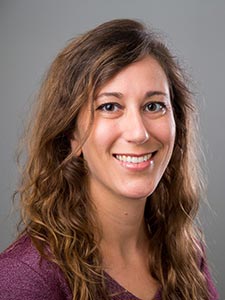An Interview with Dr. Erin Hambrick about her experience as a facilitator of a Faculty Learning Community.
The Office of the Provost and Executive Vice Chancellor, as part of RooSTRONG, funded faculty participation in learning communities to explore teaching practice. FLCs are cohorts of faculty members, across all ranks, including non-tenure track, from different disciplines or fields of study. The community provides a supportive environment where faculty can tune into a variety of activities and experiment with new approaches to teaching, share successes and challenges, launch scholarly work, and disseminate instructional practices and tools.

Dr. Erin Hambrick
- Assistant Professor
- Department of Psychology
- College of Arts and Sciences
- Directory link
Alexis: Which Faculty Learning Community are you leading?
Erin: Cognitive Bandwidth and Trauma-Informed Teaching and Learning
Alexis: What is the focus?
Erin: This FLC was focused on people who have experienced trauma or other sorts of adversities that might influence the degree of cognitive bandwidth that they have available to them as learners on the UMKC campus.
Alexis: Spring 2020 was the first time UMKC formally offered FLCs through the Provost Office. How did it come together for your group?
Erin: From the beginning, one thing made me really motivated was noticing how hungry and excited faculty were to have a forum to discuss critical issues with one another, and also a forum in which they could advance their own learning. Faculty give so much time thinking about how we teach our students. But the faculty desire to continue to grow and learn is strong and there aren’t a lot of natural outlets available.
Alexis: What was the most challenging aspect of facilitating the FLC?
Erin: Scheduling was extremely tough because we purposefully pulled from a diverse pool of faculty from across campus and from across disciplines. Finding times that converge was absolutely hard. Getting interest and buy-in was not hard whatsoever.
Alexis: How did the COVID-19 crisis affect the FLC?
Erin: We spent some of the early meetings talking over things that faculty wanted to do this semester. Faculty began reading articles about the ways that trauma, adversity, and being of a particular race, ethnicity, or gender identity status can disadvantage the bandwidth available to students. We had meetings brainstorming and thinking about how to disseminate the information to other faculty members. We began discussing how to conduct the business of higher education through a trauma-informed lens. We had many big ideas …. And the COVID-19 crisis landed in the middle of them.
In some ways having our own bandwidth reduced helped us focus on what’s feasible within one semester. Because of time contraints, we all began to recognize that actually, a very important outcome of something like this is our ability to grow in our own learning, our own recognition of a problem, and our ability to brainstorm about the ways that we individually can contribute to tackling this problem on campus.
At the beginning everybody was thinking external, you know, how do we help others learn all the stuff that we’re learning? It’s so important and it’s so exciting. Then we shifted and began to consider what is our individual responsibility? I really saw faculty talking about and thinking through action steps for improving their own teaching. They also did that in ways that they can support others who are interested in down the road. It might be that other faculty could then utilize the tools and strategies members of this FLC developed in their own classes.
Alexis: In what ways, if any, did the FLC provide natural support for faculty?
Erin: We shifted focus and decided to use the time that we have together to talk about how the COVID-19 crisis could be affecting bandwidth in our students and what we might be able to do about it right now. We are currently going through something that could be reducing bandwidth, not only for students, but also for us as faculty. That led the group to value the time that we had together to be able to discuss, and ultimately better relate to, what it is that our students are experiencing. When we ourselves are part of a crisis and are noticing what it feels like to have bandwidth reduced … I think the material really came to life for faculty. I have a lot of hope for how faculty will very genuinely be able to take some of these principles and apply them in future semesters.
Alexis: Why should we continue faculty learning communities?
Erin: For me the ability to connect with faculty about a topic that we all identified as important, and then to be able to have the space to learn and engage is great. It is different from a workshop that meets once. We revisited our topic over time and got the benefit of developing relationships in a supportive setting. It also allowed me to create connections across campus that I will rely on and keep up with in the future. And so I just think that that outcome was really realized.

